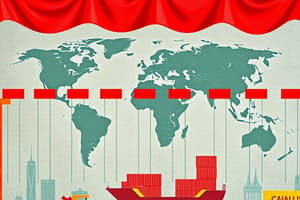Podcast
Questions and Answers
Which of the following is NOT a reason for migration mentioned in the text?
Which of the following is NOT a reason for migration mentioned in the text?
- Intermarriage
- Employment opportunities
- Poverty (correct)
- Education
What does the text imply about the impact of globalization on individual perspectives?
What does the text imply about the impact of globalization on individual perspectives?
- It potentially impacts individuals' views towards their own society. (correct)
- It homogenizes individual perspectives across the world.
- It has no impact on individual perspectives.
- It reinforces existing individual perspectives.
Which of the following is an example of how technology facilitates globalization?
Which of the following is an example of how technology facilitates globalization?
- Increasing cybersecurity threats across borders.
- Enabling the spread of misinformation and propaganda.
- Allowing instantaneous feedback and negotiations through communication technologies. (correct)
- Automating manufacturing processes globally.
What does the text suggest about the impact of globalization on cultural diversity?
What does the text suggest about the impact of globalization on cultural diversity?
What does the term 'deterritorialization' refer to in the context of globalization?
What does the term 'deterritorialization' refer to in the context of globalization?
Which language is closest to being a global language?
Which language is closest to being a global language?
What does the text suggest about the role of technology in facilitating global communication?
What does the text suggest about the role of technology in facilitating global communication?
Which of the following is NOT mentioned in the text as an area potentially impacted by globalization?
Which of the following is NOT mentioned in the text as an area potentially impacted by globalization?
What does the text suggest about the impact of globalization on national perspectives?
What does the text suggest about the impact of globalization on national perspectives?
What does the text imply about the relationship between globalization and cultural diversity?
What does the text imply about the relationship between globalization and cultural diversity?
Flashcards are hidden until you start studying
Study Notes
Definition of Globalization
- Globalization involves interconnectedness among societies and individuals, with porous national borders.
- Key actors in globalization include transnational corporations, social networks, and international organizations, in addition to national governments.
Impact on Cultures
- Globalization influences the economy, politics, and culture: beliefs, norms, values, language, food, and clothing.
- Perspectives on globalization vary:
- Some argue it leads to cultural convergence and a decline in diversity.
- Others see it as a catalyst for change that doesn't erase national identity, promoting "deterritorialization."
Technological Influence
- Advances in technology contribute to the shrinking of the world, enhancing global communication.
- The internet has revolutionized connections, allowing real-time interaction across vast distances.
- Technology enriches educational experiences by facilitating access to diverse perspectives.
Drivers of Globalization
- Colonization is a significant historical driver of globalization, introducing foreign cultures to local societies.
- Example: In the Philippines, colonizers brought languages, food, values, and educational systems that persist today.
- Similarly, countries like Singapore, Malaysia, and Indonesia have integrated external influences while retaining local traditions.
Diaspora and Migration
- Diaspora refers to the dispersion of populations, historically linked to Jewish communities outside Israel.
- In contemporary terms, it describes the movement of individuals inhabiting countries different from their own, closely related to the concept of migration.
Studying That Suits You
Use AI to generate personalized quizzes and flashcards to suit your learning preferences.




